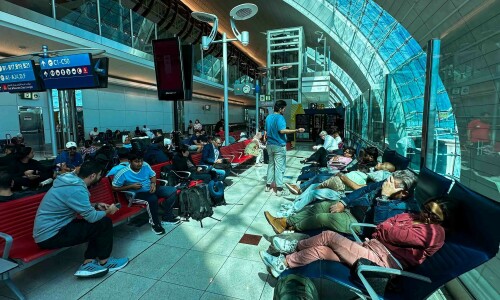Akhtar Mansour, leader of the Afghan Taliban, has reportedly been killed in Balochistan in a US drone strike. While confusion still persists over the news made known to the world initially by US officials, and subsequently corroborated by Afghan officials and the Afghan Taliban, the security equation in the Pak-Afghan region has changed once again.
Pakistan, the country that is alleged to have hosted Mullah Mansour, and said to have helped him ascend to the top of the Taliban leadership and nudged the group to the negotiating table with Kabul, is left with unanswered questions and is at the receiving end of considerable international finger-pointing.
Yet again the morass that has been Afghan policy — for many states, but perhaps most consistently for Pakistan over the past three decades — looks set to lead a number of countries into an uncertain future with few good options.
Five years since Osama bin Laden was killed in Abbottabad, and less than a year since it was revealed, though never conclusively proved, that Mullah Omar too had died on Pakistani soil, Mullah Mansour’s reported death in Pakistan is not altogether surprising.
Pakistani officials have acknowledged that the so-called influence, though not control, that the state here has over the Taliban is partly a result of providing sanctuary to Afghan Taliban leaders. If there were no sanctuary, there would be no influence — and certainly none of the control that the outside world accuses Pakistan of having over the Taliban.
Yet, it is troubling that Mullah Mansour was apparently allowed to move freely on Pakistani soil even as it became clear that the Taliban he controlled were neither lowering the intensity of the war they are waging against the Afghan state nor really looking for a way to start dialogue.
While Pakistan has rightly insisted that it cannot realistically be expected to take military action on Pakistani soil against the Afghan Taliban, surely the freedom of movement that friendly Taliban leaders are believed to still enjoy is not in Pakistan’s interests.
What is indisputably in the interest of Afghanistan, Pakistan and other regional and international powers is for the Afghan question to be settled through dialogue. However, given that the US has now bluntly stated that the Taliban leader was an impediment to negotiations and reportedly eliminated him, it is not clear who dialogue can be conducted with among the group or even if the Taliban will be able to stay united.
Whatever the case, Pakistan should be wary of repeating the process that led to Mullah Mansour’s accession and the determined attempt to unify the Taliban behind him.
With new strains in relations with Afghanistan and the US, Pakistan must be clear about what it believes it can deliver and set realistic expectations. Otherwise, the regional security situation may deteriorate further.
Published in Dawn, May 23rd, 2016















































